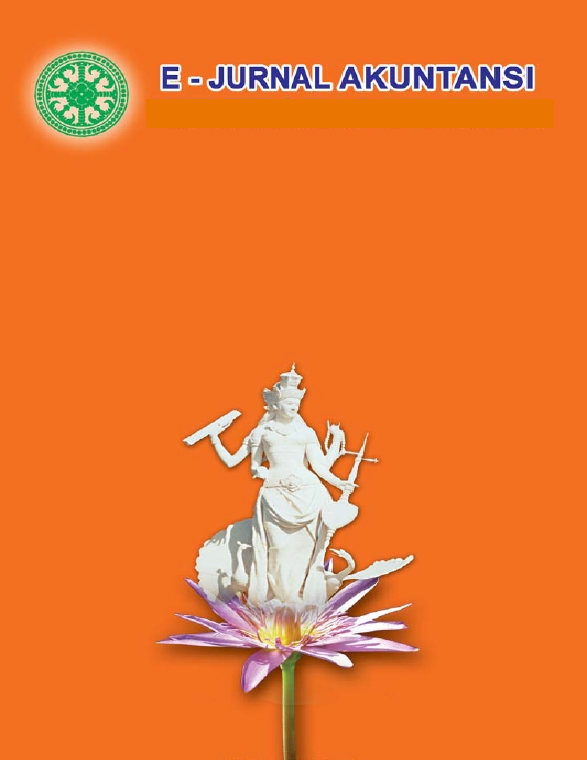Intensi Whistleblowing dalam Organizational Commitment dan Obedience Pressure Auditor
Abstract
Organizational commitment encourages individuals to act positively, such as by complying with applicable rules, having responsibilities, and maintaining good relations with their professional colleagues. However, auditors often get pressure from their superiors to take actions that violate the code of ethics. This study aims to determine whether the auditors' whistleblowing intention is influenced by organizational commitment and obedience pressure. This study used an 2x2 experimental design of 2x2 between subjects using the data obtained from a total of 66 auditors. The results show that the auditors had a whistleblowing intention if organizational commitment is high and obedience pressure low.
Keywords: Obendience Pressure; Organizational Commitment; Whistleblowing.
Downloads
References
Arifin, J. (2017). SPSS 24 untuk Penelitian dan Skripsi. Jakarta.
Barlet, H. (2019). Pengaruh kecerdasan emosional, intelektual dan etika profesi terhadap kinerja auditor pada Kantor Akuntan Publik Jakarta Timur. Penelitian Akuntansi, 1(1), 59–67.
Barrainkua, I., & Espinosa-Pike, M. (2018). The influence of auditors’ professionalism on ethical judgement: differences among practitioners and postgraduate students. Revista de Contabilidad, 21(2), 176–187. https://doi.org/10.1016/j.rcsar.2017.07.001
Bernawati, Y., & Napitupulu, G. B. (2018). The effect of organizational, induvidual, and demographic factors on the whistleblowing intention. Journal of Accounting and Strategic Finance, 1(01), 1–12. https://doi.org/https://doi.org/10.33005/jasf.vli01.21
Cahyaningrum, C. D., Ayuananda, T. I., & Arifin. (2017). Whistleblowing: studi eksperimental dalam kejujuran dan tekanan ketaatan. Journal of Accounting & Management Innovation, 1(2), 143–158.
Dekar, U., Briyan, S., & Aditya, W. (2018). Whistleblowing intention: the effects of moral intensity, organizational and professional commitment. Jurnal Akuntansi, 22(3), 354–367. https://doi.org/10.24912/ja.v22i3.393
Dewi, A. A., & Ariyanto, D. (2019). “Koh Ngomong” and A Desire to Do Whistleblowing: An Experimental Study. Journal of Accounting and Investment, 20(2). https://doi.org/10.18196/jai.2002122
Dzulasri, W. (2015). Pengaruh budaya dan gender terhadap keputusan akuntan (studi eksperimentasi semu pada mahasiswa akuntansi di Kota Padang dan Madura), 1–24.
Elizabeth, H., & Friska, F. (2013). Faktor-faktor yang memengaruhi kinerja auditor. Jurnal Bisnis Dan Akuntansi, 15(1), 13–28.
Febrina, P. (2015). Pengaruh pengetahuan auditor, pengalaman auditor, kompleksitas tugas, locus of control, dan tekanan ketaatan terhadap audit judgment (studi kasus pada perwakilan BPKP provinsi Riau). Jom Fekon, 2(2), 1–15.
Helmayunita, N. (2018). The influence of personal cost of reporting, organizational commitment, fraud seriousnesss level, and gender on intentions to whistleblowing. Business and Management Research, 57(Piceeba), 42–49. https://doi.org/10.2991/piceeba-18.2018.77
Ilham, S. (2016). Pengaruh sikap dan persepsi kontrol perilaku terhadap niat whistleblowing internal-eksternal dengan persepsi dukungan organisasi sebagai variabel pemoderasi. Jurnal Akuntansi Dan Investasi, 17(2), 209–219. https://doi.org/10.18196/jai.2016.0056.209-219
Indra, S. (2018). Analisis persepsi mahasiswa terhadap niat melakukan whistleblowing. Jurnal Penelitian Ekonomi Dan Bisnis, 3(1), 1–11.
Indriani, M., Yulia, A., & Ariska, L. P. (2019). Whistleblowing intention , personal cost , organizational commitment and fraud seriousness level. Accounting and Investment, 20(2), 129–151. https://doi.org/10.18196/jai.2002121
Jalil, F. Y. (2014). Pengaruh komitmen profesional dan sosialisasi antisipatif mahasiswa audit terhadap perilaku whistleblowing. Bisnis Dan Manajemen, 4(2), 198–209. https://doi.org/10.15408/ess.v4i2.1965
Libriani, E. W., & Utami, I. (2015). Studi eksperimental tekanan ketaatan dan personal cost : dampaknya terhadap whistleblowing. Jurnal Akuntansi Dan Bisnis, 15(2), 106–119.
Pratiwi, H. (2019). Kisruh laporan keuangan Garuda Indonesia.
Rheny, H., & Fajar, O. (2017). Pengaruh personal cost reporting , status wrong doer dan tingkat keseriusan kesalahan terhadap whistleblowing intention. Akuntansi Keuangan Dan Bisnis, 10(1), 11–20.
Rosiana, A., & Pradnya, A. (2019). Pengaruh profesionalisme , komitmen organisasi dan sensitivitas etika terhadap intensi dalam melakukan whistleblowing : studi kasus pada Badan Pengelola Keuangan Dan Aset Daerah ( BPKAD ). Jurnal Ilmiah Akuntansi Dan Bisnis, 4(1), 1–13.
Sari, N., & Yustina, T. (2018). Pengaruh audit tenure, debt default, kualitas audit dan opini audit terhadap opini audit going concern pada perusahaan manufaktur yang terdaftar di Bursa Efek Indonesia. Akuntansi, 7(1), 71–84.
Setianto, V. Y., Utami, I., & Novianti, S. (2016). Whistleblowing dalam tekanan ketaatan dan kepercayaan pada pimpinan. Jurnal Ekonomi Dan Bisnis, 19(3), 485–511. https://doi.org/10.24914/jeb.v19i3.607
Setiawati, L. P., & Sari, M. M. R. (2016). Profesionalisme, komitmen organisasi, intensitas moral dan tindakan akuntan melakukan whistleblowing. E-Jurnal Akuntansi Universitas Udayana, 17(1), 257–282.
Valen, M. A. (2018). Pengaruh kepatuhan auditor pada kode etik dan etika profesi terhadap kualitas audit (studi empiris pada Kantor Akuntan Publik di DKI Jakarta). Diponegoro Journal of Accounting, 7(4), 1–11.

This work is licensed under a Creative Commons Attribution-ShareAlike 4.0 International License.


















